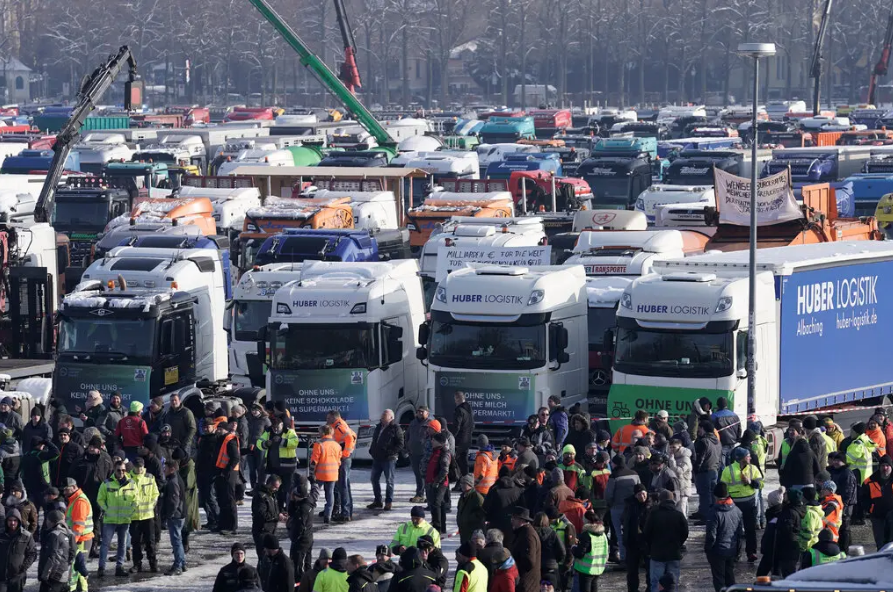
For a long time, Germany has been known for its export-oriented economic model, particularly dominating the global market in industrial machinery and high-end automobiles. So, what has led to the decline of the German economy? Here are the five key factors causing the economic predicament in Germany:
Firstly, the disruption of Russian energy supply. After the Russia-Ukraine war, Russia cut off its natural gas supply to Germany, which dealt a heavy blow to the German economy. Germany's economic model has long relied on cheap energy to drive industrial production and exports. However, once Russia stopped supplying natural gas, Germany's energy costs rose sharply, especially for energy-intensive industries such as steel, fertilizers, chemicals, and glass. The soaring gas prices became a major cost driver. To cope with this situation, Germany had to turn to liquefied natural gas, which is imported by ship after being extremely cooled and is more expensive than traditional pipeline gas. This further increased the production pressure on enterprises.
Secondly, the rise and competition from China. For many years, China's integration into the global economy has brought rich returns to Germany. German companies found that China was not only the world's largest consumer market but also a huge production base. However, with the rise of China's manufacturing industry, Germany's competitive position in the global market has been challenged. The Chinese government has strongly supported manufacturing through subsidy policies, enabling Chinese enterprises to gradually produce high-quality products similar to those of Germany. Take the solar industry as an example. In 2010, Chinese solar panel manufacturers still relied on imported German equipment, but now most of the global solar panel production is dominated by China. In addition, Chinese products such as steel, machinery, and electric vehicles are now competing fiercely with German products in the global market.
At the same time, insufficient investment and talent shortage. During the economic boom, Germany was overly confident and neglected investment in infrastructure. Nowadays, German commuters often complain about the unreliability of trains, and the outdated tracks and facilities often affect travel, even for some important infrastructure projects. Additionally, German companies are facing a severe shortage of labor, especially high-skilled workers. Although the German government has introduced some policies to attract skilled immigrants, the cumbersome approval procedures and bureaucracy still limit the introduction of immigrants. Especially for the introduction of high-skilled labor, there are significant obstacles in practice.
Furthermore, bureaucracy and inefficiency. German businesses and economists generally reflect that the lengthy approval processes and complex paperwork have significantly slowed down economic development. For example, it may take years for a company to obtain a construction permit for a wind power project. The inefficiency of many administrative procedures has increased the costs for enterprises and also slowed down the pace of innovation. Moreover, Germany's regulatory requirements for supply chains exceed those of the European Union. Although these regulations aim to ensure that enterprises comply with environmental and labor standards, they also impose a greater burden on German enterprises than those in other EU countries, further restricting the flexibility and market competitiveness of the economy.
Finally, the uncertainty of the international environment. In addition to the above domestic factors, the uncertainty of the global economic environment is also an external reason for the sluggishness of the German economy. The impact of the COVID-19 pandemic on global supply chains, the slowdown in global economic growth, and the tense geopolitical situation have all had a profound impact on the German economy. In particular, the fluctuations in energy prices, changes in global trade, and the friction between China and Western countries have put significant pressure on Germany's export-oriented economy.
In conclusion, these factors are intertwined and have jointly contributed to the sluggishness of the German economy. Germany's traditional advantages, such as cheap energy and strong manufacturing competitiveness, are gradually losing their effectiveness. Facing complex internal and external challenges, Germany needs to promptly adjust its economic strategy, enhance its innovation capabilities, and break free from the shackles of bureaucracy in order to regain vitality in global competition.

報告顯示,中國電力投資加速增長,預計2024年電網基建投資將超過5300億元。
近日,市場迎來了一則引人注目的消息:工業巨頭3M公司(MMM.N)在本周五公布了其季度業績報告,隨後股價飆升至近兩年來的
最近,外媒給OpenAI算了筆賬,今年可能要血虧50億美元。
近日,巴黎奧運會和世界鐵人三項協會聯合發布了一項重大決定,宣布因塞納河水質污染問題,原定於近期進行的奧運會鐵人三項首次下
當地時間7月18日,法國巴黎發生了一起令人震驚的持刀襲警事件。
近期,一則重大消息在國際舞臺上引起軒然大波,馬來西亞宣布加入金磚國家。
調查發現,互聯網和智能手機的使用幹擾了韓國近五分之一學生的生活。